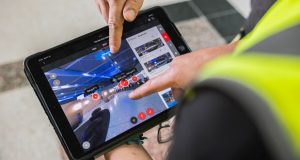Andy Barrow and Dylan Alcott reflect on the PRM services they have experienced and suggest ways to elevate the standard of PRM provision across the globe
Dylan Alcott is an Australian Paralympian with gold medals in wheelchair tennis and wheelchair basketball. His recent triumph at Wimbledon 2019 also earned him a career grand slam. Andy Barrow is a retired wheelchair rugby player who played for Great Britain across three Paralympic Games and led the team to gold in the three European Championships. Away from their respective sports, both men serve as ambassadors for OCS’s passengers with reduced mobility (PRM) service, using their platform to raise awareness and promote this crucial need for the many thousands of people with disabilities who regularly travel by air.
As Paralympians, we have been fortunate enough to represent our countries and win elite tournaments at the very highest levels. These successes have also given us the opportunity to travel across the globe sharing our experiences on TV shows and in front of live audiences.
Away from the courts, cameras, glitz and glamour, however, we have to navigate the ‘real’ world – a place that is often not built or designed to support our disabilities. For people that have reduced mobility, everyday activities and events that most take for granted can be a source of great frustration and anxiety. Nevertheless, we understand that our status as athletes has put us in a position of great privilege, and we have a responsibility to give voice to the millions of people with disabilities like ours who do not share our platform.
That’s why we have chosen to be ambassadors for OCS’s PRM service. Despite the challenges it presents, PRM passengers represent one of the fastest-growing demographics in aviation travel. While the annual passenger growth for European airports sits at about three per cent, the number of flyers with reduced mobility is increasing at an annual rate of 10-15 per cent.
That demand is putting extra pressure on airports, airlines and PRM companies to provide passengers with disabilities the service that they need. The Civil Aviation Authority states that any person with reduced mobility is entitled to assistance when travelling by air. But this must be the bare minimum. People with mobility needs deserve to travel with dignity and should expect the same high-quality service that everyone else receives.
As frequent flyers, we are starting to see positive change. Service providers like OCS have identified ways to make the experience for PRM passengers easier and safer – and their methods are being rolled out in forward-thinking airports all over the world. Three decades ago, a PRM service was no more than a handful of staff, a walkie-talkie and a wheelchair. Today, on the other hand, processes, equipment and new technologies are transforming the airport journey, from the entrance, through security, and onto the plane. New software combines flight information with special service request bookings so that people with reduced mobility can get exactly what they need, when they need it.
But great PRM service isn’t simply about applying the right tools or following the correct guidelines in the manual. As with so many other services in life, PRM excels when staff treat their passengers with warmth, humility and respect. We have spent a huge part of our sporting lives shattering stereotypes about what people with disabilities can achieve. In buildings like airports, however, we often still face the soft bigotry of low expectations.
People with disabilities are not one-dimensional beings. Each person has unique needs, their own preferences and a different set of values. What might work for one passenger, however, may upset or offend another. The solution is to treat every PRM passenger as a human and as an individual.
As OCS ambassadors, we can see how much time and care the organisation’s teams put into providing a ‘human experience’. Some of our best trips have come when those staff do something as simple as introduce themselves. In the end, people will only overcome their unconscious biases if they listen and open themselves up to lived experience of others.
These lessons also apply to the multiple stakeholders involved in a person’s journey, from booking the ticket to boarding the plane. PRM passengers need the process to be as fluid as possible. Often, we find ourselves repeating the same requests and encountering the similar issues because the different groups that make up the journey do not communicate with each other.
Our role as OCS ambassadors allows us to speak for people who do not have our knowledge or experience. This represents crucial progress because PRM services will only improve when more people like us have a seat at the table, making decisions and advising the aviation industry on the best path forward.
Travel is a human right and every passenger should be able to experience it with dignity.
- Wheelchair users
- Visual impairment / blind passengers
- Hearing impairment / deaf passengers
- Hidden disabilities
Customer Care Agents are also specifically trained and coached to recognise and support those with ‘hidden disabilities’ including:
- Dementia
- Autism/Aspergers
- Mental health
- Stomas
- Visual, sensory and hearing impairments
All of the frontline staff now receive Dementia Friends Training, and hidden disability awareness has been built into all of its induction and refresher training. For the future OCS is continually developing its service to: Improve the passenger experience Enable more passengers with disabilities to use air travel Ensure on-time performance (OTP) for airlines
For more information visit: www.ocs.com/uk/services/passenger-assistance-and-aviation-support/passenger-assistance/




